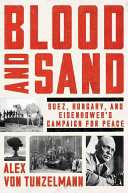2018 School Spending Survey Report
Blood and Sand: Suez, Hungary, and Eisenhower's Campaign for Peace
Harper. Oct. 2016. 560p. maps. notes. bibliog. index. ISBN 9780062249241. $32.50; ebk. ISBN 9780062249265. HIST
COPY ISBN
VERDICT This convincingly argued book is a timely and insightful must-read for anyone who cares about Middle Eastern history or 20th-century diplomacy, as well as students of global affairs.
RELATED
ALREADY A SUBSCRIBER? LOG IN
We are currently offering this content for free. Sign up now to activate your personal profile, where you can save articles for future viewing




Comment Policy:
Comment should not be empty !!!